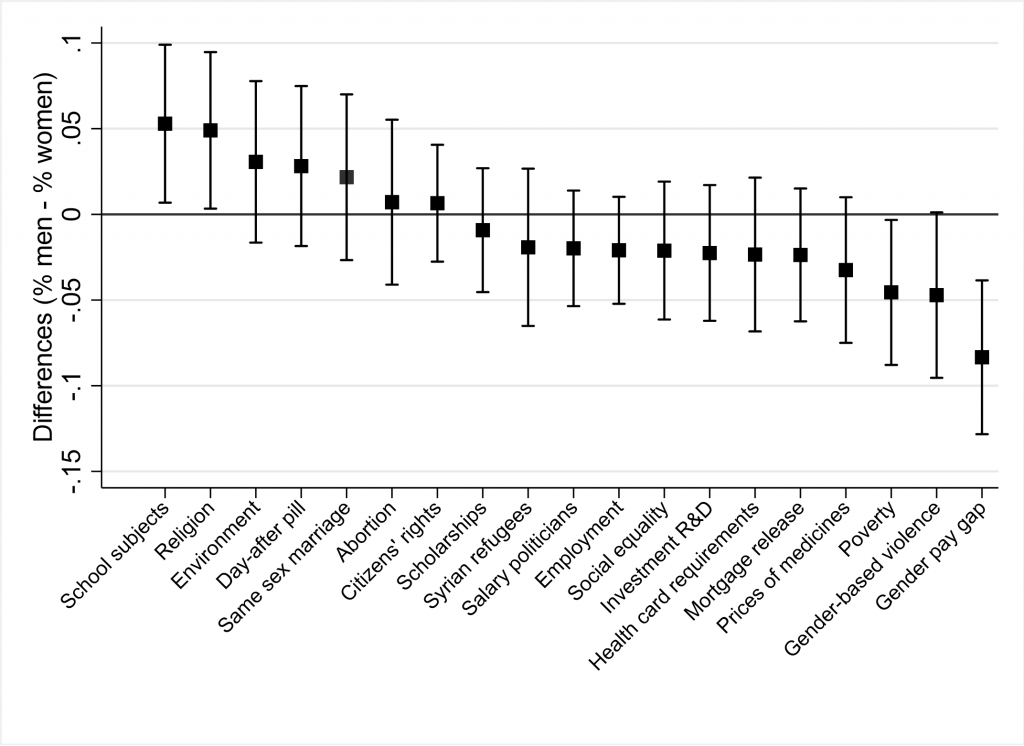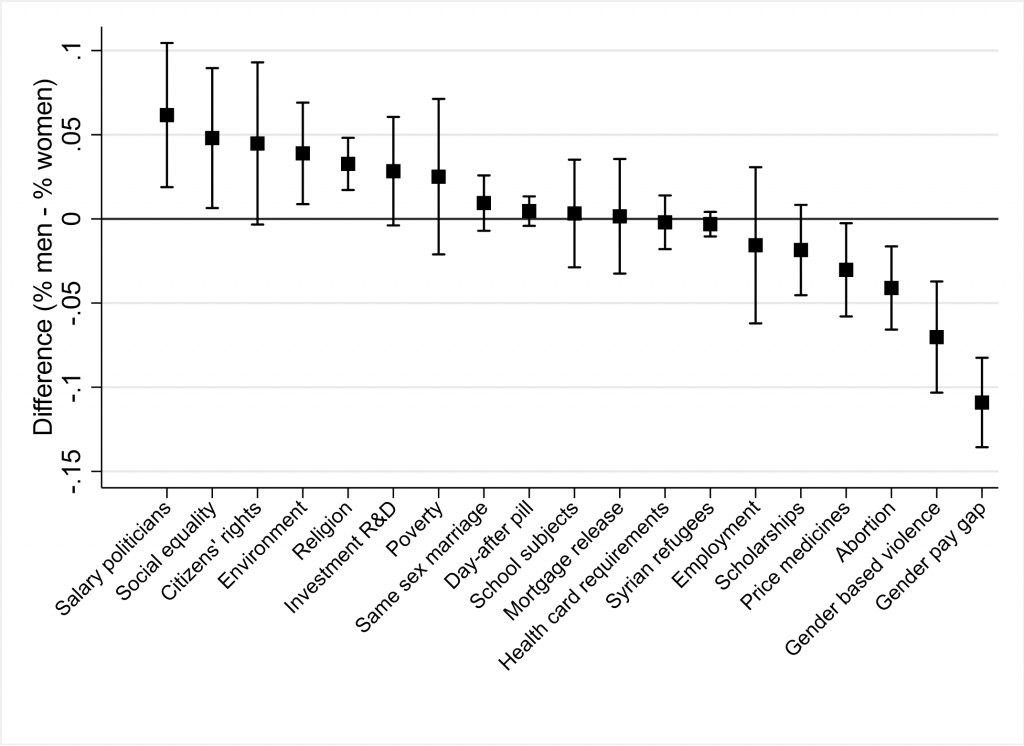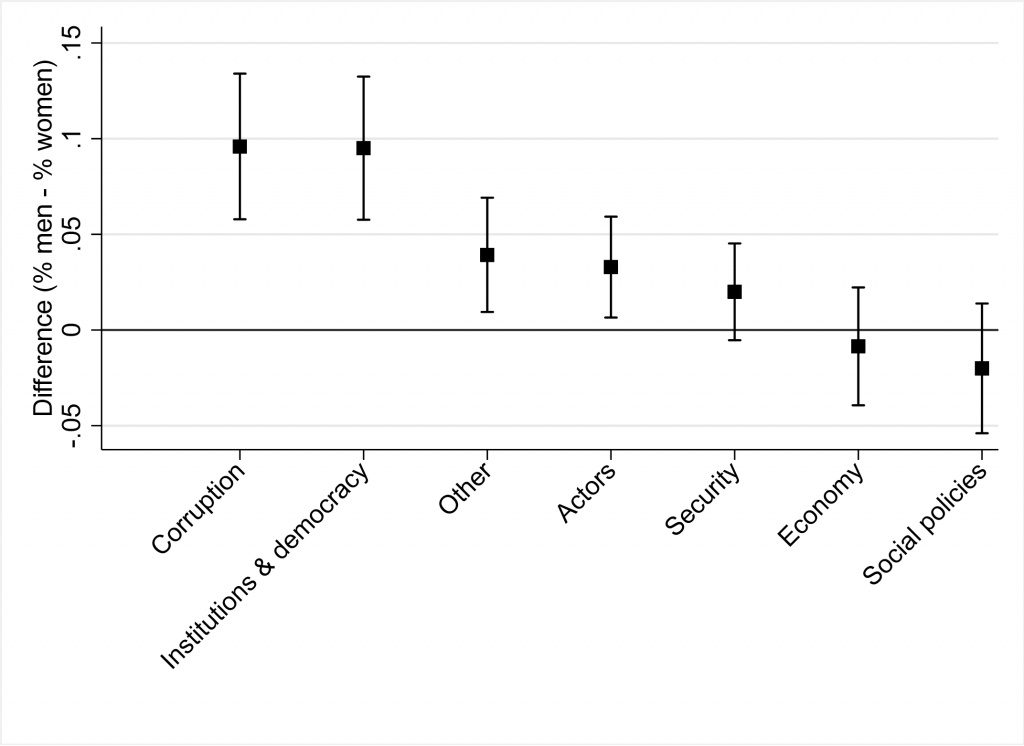A persistent finding in public opinion research is that men, on average, tend to express more interest in politics than women. Drawing on new research on the views of Spanish citizens, Marta Fraile, Raúl Gómez, Mónica Ferrín and Gema García-Albacete explain that one potential reason for this is that the questions contained in surveys might obscure hidden differences in the way men and women think about the political world. Addressing these deficiencies would provide a better indication of citizens’ real engagement with politics.
One of the most consistent regularities in public opinion research is the existence of substantial gender gaps in political interest in most democracies. When asked the question “How interested are you in politics?”, women declare lower levels of interest in political matters than men. For years, researchers have been trying to explain this phenomenon on the basis of political socialisation, differences in resources and contextual factors. But, what if the political interest of men and women was not equally captured by the standard survey question we have been using for decades?
In a recent study, we build upon an emerging line of research that questions the gender neutrality of some of the instruments used in survey research, demonstrating that the standard indicator of political interest does much better at capturing the political interest of men than that of women. We therefore call upon the research community to develop alternative, gender-neutral measures of political interest that provide a more accurate picture of women’s interest in a range of political topics.
The mainstream view in survey research considers political interest to be a unidimensional concept. In our view, this is potentially problematic. The abstract concept of ‘politics’ evokes the idea of interest in ‘government’, ‘parties’ and conflict over ‘policies’. In our opinion this conception of politics as having to do with government and conflict may not be gender neutral and might actually overlook the existence of gender differences in the way in which political interest is expressed.
It is possible that people’s understanding of the word ‘politics’ depends on their gender and that women do not share the same definition as men. Moreover, even if men and women shared the same definition of politics, we cannot discard the possibility that the socially accepted definition might in fact be biased towards aspects of politics that men are typically more interested in. So, when women answer questions about their general interest in political matters, they may be declaring a lower degree of interest than they actually have partly because they disregard their interest in other aspects of politics.
To investigate these possible sources of bias, we fielded a nationally representative online survey in Spain where we tried to unpack the standard indicator of general political interest. We first provided respondents with a list of 19 topics related to different political domains and asked them to pick those that they considered to be political. Secondly, we asked respondents to select those topics from the list that they were personally most interested in. Finally, we also offered respondents the possibility to volunteer any additional political topics that they were interested in but were not included on our initial list.
Our findings show small gender differences in the topics that respondents considered to be political. Figure 1 shows that while men were more likely than women to consider topics as diverse as school subjects, religious and environmental issues, the day-after pill, same-sex marriage, abortion and citizens’ rights as being ‘political’, women were more likely to mention topics ranging from scholarships and refugees to poverty, gender-based violence and the gender pay gap.
These gender differences however were only statistically significant for two topics: poverty and the gender pay gap for women, and school subjects and religion for men. This led us to conclude that gender does not greatly affect the way people define/understand the political realm. Moreover, we did not find any significant relationship between people’s declared interest in politics and the topics that they considered to be political.
Figure 1: Difference between men and women’s views on whether selected topics are ‘political’
Note: A figure above zero indicates that men were more likely to view the topic as being political than women, while a figure below zero indicates women were more likely to view the topic as being political than men. The bars for each topic represent confidence intervals: only the bars for ‘school subjects’ and ‘religion’ are located entirely above zero and therefore indicate that a statistically significant difference was found (with men being more likely to view the topic as being political than women). The same is true for the ‘poverty’ and ‘gender pay gap’ topics, with women more likely to view the topic as being political than men. For more information, see the authors’ accompanying paper in the International Political Science Review.
Next, we analysed whether gender was associated with a higher propensity to be interested in particular topics. And here, we found both larger and more statistically significant differences between genders. As Figure 2 shows, men have a greater propensity to be interested in topics related to representation (i.e. the salary of politicians) and contentious partisan issues (including the role of religious values, which is a partisan issue in Spain).
Men are also more likely to be interested in social issues when framed as general principles rather than specific policies (e.g. ‘social equality’), thus evoking the idea of conflict over resources. In contrast, women are significantly more likely to be interested in topics that relate to their closest concerns (the gender pay gap, abortion, and gender-based violence) as well as specific welfare issues and policies (e.g. the ‘price of medicines’).
Figure 2: Difference between the self-declared interest of men and women in various topics
Note: A figure above zero indicates that men were more likely to express interest in the topic than women, while a figure below zero indicates women were more likely to express interest in the topic than men. The bars for each topic represent confidence intervals, with bars located either fully above or below zero indicating these were statistically significant differences. For more information, see the authors’ accompanying paper in the International Political Science Review.
We also found significant gender gaps in the open-ended answers, which we coded. Figure 3 suggests that men are (significantly) more likely to volunteer interests related to corruption, followed by institutions and democracy. In contrast, women tend to volunteer more topics related to social policies (a difference that became statistically significant after controlling for respondents’ age and education).
Figure 3: Difference in the percentage of men and women mentioning each topic in an open-ended question
Note: A figure above zero indicates that men were more likely to raise the topic than women, while a figure below zero indicates women were more likely to raise the topic than men. The bars for each topic represent confidence intervals, with bars located either fully above or below zero indicating these were statistically significant differences. For more information, see the authors’ accompanying paper in the International Political Science Review.
Are those gender differences in the topics that respondents declared to be interested in connected to the gender gap in general political interest? We regressed responses to the standard question of political interest (‘how interested in politics are you?’) on the topics that respondents were interested in as well as socio-demographic controls (age and education). And we did this for our two measures of interest: the closed and open-ended question.
Our findings indicate that, regardless of the measure we use, political interest is higher on average among those who are interested in those issues that are of greater interest for men. In contrast, being interested in issues that women are significantly more interested in does not seem to lead people to declare greater interest in politics – the only exception is interest in abortion. Importantly, we also found that the gender gap in political interest vanished once we considered respondents’ specific interests. This suggests that when women are asked about their general interest in politics, they may be overlooking their interest in a wide range of political issues to focus mainly on topics that they tend to be less interested in but are socially considered to be most strongly linked with the abstract concept of ‘politics’.
Is the picture of society portrayed by the standard unidimensional question employed by most research on political interest inaccurate? Our findings, which are consistent with previous research, reveal that the gender gap shown by standard indicators may sometimes hide the distinct substantive interests of women and men. This not only affects the existing evidence of gender gaps in political involvement, which may need to be revisited, but could also potentially shape other measures of political engagement. Male-coded interpretations of politics are likely to arise in standard questions that ask about politics in an abstract manner, even if they seem neutral at first sight.
We need to experiment with several ways of asking respondents about their degree of interest and involvement in politics, opening the door to gender-balanced measures of citizens’ views and opinions about politics. Enlarging the list of items to include the potential interests of women and men would probably bring about substantial improvements. We recognise that seeking alternative measures is costly, but it is absolutely necessary if we are to take gender seriously in political and social research.
This article is published in collaboration with Agenda Pública
Please read our comments policy before commenting.
Note: This article gives the views of the authors, not the position of EUROPP – European Politics and Policy or the London School of Economics. Featured image credit: Hernán Piñera (CC BY-SA 2.0)
_________________________________
 Marta Fraile – Consejo Superior de Investigaciones Científicas
Marta Fraile – Consejo Superior de Investigaciones Científicas
Marta Fraile is Senior Research Fellow at the Consejo Superior de Investigaciones Científicas (CSIC) (Instituto de Políticas y Bienes Públicos-Madrid).
–
 Raúl Gómez – University of Liverpool
Raúl Gómez – University of Liverpool
Raúl Gómez is a Senior Lecturer at the University of Liverpool.
–
 Mónica Ferrín – University of Coruña
Mónica Ferrín – University of Coruña
Mónica Ferrín is Intalent and Ramón y Cajal Researcher at the University of Coruña.
–
 Gema García-Albacete – Universidad Carlos III de Madrid
Gema García-Albacete – Universidad Carlos III de Madrid
Gema García-Albacete is Assistant Professor at the Department of Social Sciences, Universidad Carlos III de Madrid.






